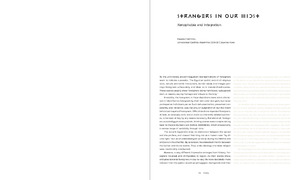Por favor, use este identificador para citar o enlazar este ítem:
https://repositorio.uca.edu.ar/handle/123456789/15620| Título: | Strangers in our midst : xenophobia and integration | Autor: | Flammini, Roxana | Palabras clave: | DISCRIMINACION; INMIGRACION; ANTIGUO ORIENTE; ANTIGUO EGIPTO | Fecha de publicación: | 2017 | Editorial: | Kehrer Heidelberg Berlin | Cita: | Flammini, R. Strangers in our midst : xenophobia and integration [en línea]. En: Babej, M.E. (ed.). Yesterday – Tomorrow: A Work in Aspective Realism. Berlín: Kehrer Verlag; 2017 Disponible en: https://repositorio.uca.edu.ar/handle/123456789/15620 | Resumen: | Abstract: To the uninitiated, ancient Egyptian representations of foreigners seem to indicate a paradox. The Egyptian public record of religious texts, temple and tomb inscriptions, border stelae and images portrays foreigners unfavorably, and does so in standardized scenes. These scenes usually show foreigners being humiliated, subjugated, slain, or meekly paying homage and tribute to the king.1 Invariably, the foreigners in these depictions were stock characters — identified as foreigners by their skin color and garb, but never portrayed as individuals per se. Such dehumanization, presented consistently over millennia, was not only an outgrowth of, but the intent behind portrayals of foreigners. Official doctrine regarded foreigners, at best, as necessary evils, and at worst as inherently deleterious forces, to be kept at bay by any means necessary. But above all, foreigners outside Egypt were symbols. Smiting scenes were a staple dating back to the pre-Dynastic era (before 3000 BCE), which showed only a narrow range of variability through time. The ancient Egyptians drew no distinction between the sacred and the profane, and viewed their king not as a human ruler “by divine right,” but as an embodied god (a Horus during his lifetime and an Osiris in the afterlife). By extension, he embodied the link between the human and divine realms. Thus, state ideology and state religion were inextricably intertwined. | URI: | https://repositorio.uca.edu.ar/handle/123456789/15620 | ISBN: | 978-3-86828-793-6 | Disciplina: | HISTORIA | Derechos: | Acceso abierto | Fuente: | Babej, M.E. (ed.). Yesterday – Tomorrow: A Work in Aspective Realism. Berlín: Kehrer Verlag; 2017 |
| Aparece en las colecciones: | Libros/partes de libro |
Ficheros en este ítem:
| Fichero | Descripción | Tamaño | Formato | |
|---|---|---|---|---|
| strangers-in-our-midst.pdf | 147,17 kB | Adobe PDF |  Visualizar/Abrir |
Visualizaciones de página(s)
35
comprobado en 27-abr-2024
Descarga(s)
19
comprobado en 27-abr-2024
Google ScholarTM
Ver en Google Scholar
Altmetric
Este ítem está sujeto a una Licencia Creative Commons

